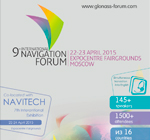Participants of the 8th International Navigation Forum and Navitech Exhibition determine further ways of developing Russian navigation market

5 May 2014
"In Russia the penetration of transport monitoring and management systems into the market of municipal and commercial customers reached 15%. This number is already close to world average indexes for the navigation industry. This factor is certainly a cause of the growth rate reduction of the Russian navigation market," the experts recently noted during the 8th International Navigation Forum and NAVITECH Exhibition. So, by the end of 2013 around 400 thousand vehicles were equipped with navigation and communication devices (about the same number of vehicles were equipped in 2012). In conditions of the growth rate reduction the forum and exhibition participants looked for new ways of developing the navigation market in Russia. "The navigation market growth rate has really reduced. There were several factors contributing to this: and the economic growth rate reduction in general, and the reached high numbers of the general market penetration of monitoring systems in the market of corporate and state customers, and the influence of the rapid introduction of tachograph control systems. Therefore, the current stage can be characterized as the preparation of market players for new development stage. Further impetus to the market development can become large federal projects (for example, such as ERA-GLONASS) that will create a mass market. ERA-GLONASS provides for equipping the entire transport of Russia - over 40 million vehicles. All market players are preparing for the work with mass consumers," CEO of SpaceTeam Holding Alexei Smyatskih said.
The classic monitoring systems, according to the forum participants, exhausted their growth reserve. "It is necessary to expand the horizon of providing navigation and information services to consumers, to enter new markets, to try out new niches, to develop new business models," CEO of Scientific Research Institute of Applied Telematics Vitaly Poltoratsky added.
"At the moment the first-priority goal for market players will be to develop a business direction of GLONASS. Several years earlier GLONASS was developed with the active state support, which is confirmed by the big number of federal projects launched. You should agree that the state can not support endlessly. So, for example, in January 1, 2015 the ERA-GLONASS system will be put into its commercial operation. There should be a feedback from business in the form of offers for monetizing services provided on the basis of the single technological platform "ERA-GLONASS". Now it is necessary to decide, what business models to develop, what services to provide, how to get benefits from the participation in joint projects. Thus the Navigation Forum became a starting point for the joint discussion of key issues of the industry," Svetlana Khadonova, Marketing Director of SpaceTeam Holding, added.
In the end of the Forum and Exhibition the market players worked out the following development directions for the Russian navigation market:
Trend One. Emphasis on a mass consumer
The Navitech Exhibition fully demonstrated the technology capacity for providing navigation and information services to end-users. The various gadgets based on GLONASS and GPS satellite navigation systems are ready to help solve issues of monitoring people and pets, ensure safety, navigate indoors with getting different content and many other things.
"if in the past we only spoke about navigation service opportunities, now there is time really came to use them. The figures speak for themselves, only over 2013 the sales volume of navigation collars increased in several times! It is a very positive tendency for the market. Undoubtedly there is a big contribution from manufacturers of navigation chips, which are reduced in size every year keeping their high productivity and accuracy of object positioning," Alexander Kolomensky, Head of the GPS-Club Project, commented.
There is an interesting solution from Getsy that demonstrated new opportunities to receive important content in off-line mode at NAVITECH. Using iBeacon technology the special beacons interact with a consumer smart-phone and allow gaining access to important information, for example, of shopping malls, airports, museums, etc. The main focus of the iBeacon technology is content important for a user in the right place and at the right time. Also, jointly with Navigine, Getsy showed an example of using indoor navigation on the basis of iBeacon beacons.
A special attention was given to a GLONASS schoolbag designed for ensuring school children's safety. The schoolbag allows parents to track their child's location, in the real time mode, from any device having access to the Internet. The schoolbag is equipped with a miniature beacon that goes on in case of emergency, for example, if the child is attacked, and sends an alarm signal to the parents.
The schoolbag can also 'bug' the child's environment. In case of danger the child can push an emergency button, also built in the schoolbag, and send an alarm signal to the parents. The GLONASS schoolbag prototype was developed by SpaceTeam Holding, at the moment it is being tested before being put into mass production.
"Every year Russian consumers get more and more interested in the practical application of satellite technologies in their everyday life. Even today the modern GLONASS devises provide a wide range of opportunities to control mobile and immovable objects. Generally the GLONASS application area is unlimited: agriculture, sports, health care, travel, entertainment, etc. Here there are big prospects available," Editor of Vestnik GLONASS Konstantin Kreidenko noted.
According to the Executive Director of the Association "GLONASS/GNSS-Forum" Vladimir Klimov, by the end of 2014 the level of the navigation and information services penetration into the Russian navigation mass market will be around 10% from the entire volume of provided telematic services, reaching 1,2 billion rubles.
As the president of the NP "GLONASS" Alexander Gurko said, in the nearest future it will be navigation and information services for motorists that will have the highest growth indexes. It is related to putting the ERA-GLONASS system into commercial operation.
Alexander Gurko draw the Forum attendees' attention to the fact that in the top twenty of the most innovative companies of the world there were 18 companies representing the IT/Telecom industry and automotive industry. Thus a new innovation round will take place in the automotive field.
"Two alliances are already created, one - under the auspices of Apple, the other - of Google, in the framework of which they form normative bases, work out aspects of the technical regulation, create standards. So the car is becoming the most expensive gadget. Between the players there is a fight for standards, whose standard will win and what services will be used in the nearest future," Alexander Gurko commented. In his opinion the development of modern technologies in the automotive industry gives Russian companies a chance participate in creating new technologies for new markets as well.
Trend Two Transport monitoring and management systems entering new market segments
In conditions of high competition on the market of classic 'box' monitoring systems the creation of sectoral, 'niche' products specifically for an industry client business is the most logical business scenario developing a product line for most vendors and system integrators.
"The market of transport monitoring is far from exhausting tis potential, however year by year we observe the decrease of profits from classic box solutions. It makes the players look for new ways of developing the business, firstly, look for new market segments, secondly, focus on the system integration, create complex systems operating at the junction of different technologies, in which the share of GLONASS equipment doesn't exceed 15%. These are complex solutions designed for specific business processes of a customer. It means the more specific tasks the system can solve, the more sustainable it is. The time of 'cockroaches running along the map' passed a long time ago," CEO of SpaceTeamService Andrei Platonov thinks.
Such examples of creating complex solutions are already on the market. For example, in 2012 the Russian developers jointly with the international airport "Vnukovo" created the first for the avian industry integration of the transport monitoring and management system based on GLONASS with key airport management systems; for the purpose of ensuring the safety and maximum transparency of alcohol product transportation they developed on-board explosion-proof GLONASS equipment; for the purpose of ensuring public transport passenger safety they developed the Transport-Video system.
Transport-Video® software bundle was presented at the NP "GLONASS" booth during the Navitech Exhibition. "The software bundle controls transportation participants in the on-line mode, constantly collects and analyzes information about traffic incidents, and in this way reduces the number of traffic emergencies," Head of the Regional Development of SpaceTeam Holding Artem Popov told.
In the context of the Transport-Video software bundle they demonstrated a solution that can be integrated into the transport monitoring and management system - Japanese Anti-Sleep system. "This solution controls the state of a driver behind the wheel. By means of special detectors the device runs check studies of the driver's condition in th real time mode and informs a dispatcher about it: a level of fatigue, attention concentration and wakefulness. If the driver's condition is close to sleeping, Anti-Sleep automatically gives warning signals to the driver," Anna Evtushenko, Senior Sales Manager of Hitachi High Technologies RUS, added.
Trend Three. Participating in the ERA-GLONASS project development
In the opinion of market players the powerful impetus to the market development will be the ERA-GLONASS project in its part of creating navigation and information services for motorists. Starting January 2015 the ERA-GLONASS system is being put into commercial operation. In the nearest future the single technological platform of the ERA-GLONASS system will not only be able to become a uniting technological platform for developing consumer services, but also will allow ensuring the system's operations (tolling trucks, tachograph control, transport monitoring systems, accident emergency response and others) in a single multi-functional device.
As the NP "GLONASS" experts said, in 2013-2014 over 11 GOST standards were approved, over 11 substatutories in developing the federal law about the ERA-GLONASS system are planned to be passed. In 2014 the analogue of the ERA-GLONASS system will be actively developed in Belarus and Kazakhstan. Also next year the regulations of the Customs Union are coming into force. The efforts of the Customs Union members will allow very quickly forming a single navigation and information space in several states and enhancing the quality of navigation and information serves delivered to consumers.
The big progress, according to the market experts, takes place in the framework of developing and mass producing ERA-GLONASS terminals. Over 20 foreign and Russian manufacturers develop equipment with the consideration of the system requirements.
"As for the trends in developing equipment, now the 4-system navigation equipment, which supports, besides GLONASS and GPS, Gelileo and Beidou, sart being produced. Today some companies are starting to develop such an equipment, and our companies will actively participate in this," NP "GLONASS" representatives said.
Trend Four. Developing the market of insurance telematics
The ERA-GLONASS system gives new opportunities to motorists, insurance and service companies. During the Forum the participants noted that before June 1, 2014 the amendment to the law about OSAGO referring the use of Europrotocol applying video and photo capturing devices, as well as the GLONASS satellite navigation, will be passed. Such an amendment will give a serious push to the development of insurance telematic services based on the GLONASS technology.
In the opinion of the head of the department on work with automobile manufacturers of SpaceTeam Holding Gennady Gudumak, ERA-GLONASS gives insurance companies an opportunity to exchange databases. I think that then comes the issue of creating an expert company in the insurance telematic market, which will deal with administering this database and upon request giving information about a motorist and his/her style of driving not only to insurance companies but to owners of other vehicles. The introduction of such navigation and information solutions will allow motorists to save money on insurance, and insurance companies to identify real committer of traffic accidents.
Trend Five. Participating in large-scale state projects
As key trends the market players marked the creation of regional navigation and information systems in subjects of the Russian Federation (in accordance with the Russian Government Resolution #1367 dated by December 21, 2012), as well as the creation of a system of tolling heavy vehicles weighing over 12 tons.
"On May 15, 2014 they plan to run proposal contest for participating in the creation of the tolling system," Alexander Gurko added. By the end of next year, according to the industry expert forecast, the system of tolling heavy vehicles will be created.
The participants of the 8th International Navigation Forum and Navitech Exhibition determined main development trends of the navigation market. However, it is worthy to note that the market itself constantly changes, the structure of consuming services changes. The in-vehicle navigation remains fundamental, but already includes a wide range of other technologies. Thus, that one wins, who starts using a very complex approach to solving consumer issues.

































































